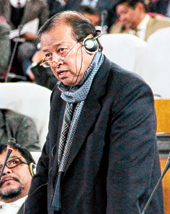 |
| R.C. Laloo speaks in the Assembly on Monday. Picture by UB Photos |
Shillong, Nov. 24: The Meghalaya government told the Assembly today that it had approached the Central Board of Secondary Education to include Khasi in its curriculum.
It also admitted that it had changed the status of Modern Indian Languages (MIL), including Khasi, to “elective” from “compulsory”.
The statements were made on the second day of the winter session of the Assembly during a discussion on the status of Khasi language in the educational framework.
Deputy chief minister R.C. Laloo said in 2011, the government had “approved the Meghalaya Board of School Education regulation for the Higher Secondary School Leaving Certificate Examination, changing the status of MIL to an elective subject in view of the dynamic changes in the field of education”. He was replying to a query by UDP legislator Paul Lyngdoh.
Lyngdoh said the decision to make Khasi an “elective” subject could affect the only surviving language (read Khasi) of the Mon-Khmer group of languages.
Replying to the Opposition, he defended the decision, saying scope should be given to students to make informed choices on subjects of their interests.
He said while checking the status of different examinations, he had learnt that Khasi was not included in the CBSE (curriculum) and had directed the principal secretary (education) to take up the matter with the board.
Laloo said the principal secretary had already taken up the matter. Replying to a call attention motion tabled by HSPDP legislator Ardent Miller Basaiawmoit, Laloo said the state board had introduced innovative schemes for long-term development and welfare of students.
Basaiawmoit had said that the issue of language was “very sensitive” with the tribal people as it has a very strong attachment to the identity of a community. He recalled that the Assam government’s decision to impose Assamese as an official language had led to the hill state movement.
He said the Meghalaya Board was “barking up a wrong tree” by “degrading” Khasi from compulsory to elective subject, which amounted to “withdrawal” of the subject from the syllabus.
Laloo defended the move saying it would allow students more scope in choosing their subjects of interest and give them a sound footing in choosing job-oriented courses. He pointed out that in 2010, the board’s examination committee had recommended giving liberty to students to choose their subjects. Therefore, it was decided that MIL would be considered an elective subject while English would continue to be a compulsory subject.
“The new scheme of studies for arts, science and commerce implies that the students will have an added advantage of having four elective subjects to choose from and not just three as in the old scheme,” Laloo said.
Refuting the allegation that stakeholders were not consulted before the decision was taken, Laloo said all heads of institutions were well informed about the board’s proposal to change the existing structure and scheme of studies at the HS level.
He said it was not true that Khasi had been removed from the course of study. “The step is not discriminatory towards Khasi language at all. After MIL has been made an elective subject, there is more registration and enrolment in the Khasi language than before. It is a myth to claim that we are discriminating against the language. In fact, the steps taken are progressive, by giving more flexibility to students,” he said.
He said boards like CBSE and council for ICSE, as well as state education boards of Jharkhand, Punjab and Mizoram, among others, had MIL in their list of electives.










